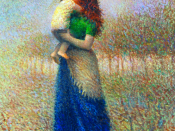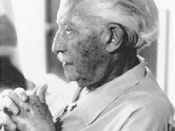Erik Erikson's Psychosocial Theory.
Question 1:
Erik Erikson (1902-1994) was a theorist of human development who emphasized on the psychosocial outcomes of human development. Psychosocial is a word used to describe how a child develops through social interaction within his environment, and how this has an impact on child development (Carpenter, et al. 2001). His work is constructed in age-related stages in which he calls the 'psychosocial stages'. This theory encompasses eight age-related stages from the time an infant is born up until old-age. I will briefly discuss the first five stages which are from the ages 0 - adolescent.
The first psychosocial stage in Erikson's theory is Trust vs. Mistrust which is between the moments of birth up until the infant is one. During this period Erikson hypothesized that the infant will gain a sense of trust for others who provide warmth, comfort, nourishment and so forth. For example, a mother who breast feeds when the child is hungry, this creates a bond in which the child gains a sense of trust towards his mother.
If his basic needs are not met as the caregiver is not responsive or the child is badly treated, then this could result to mistrust in himself and also others (Berger. 1998).
The second stage in Erikson's theory is Autonomy vs. Shame and Doubt and occurs from the age of one up until the child is three. Within this stage the child is at the exploring age in which he uses his new mental and motor skills to be self-sufficient in such activities as feeding, walking, talking etc. Parents who let this happen foster autonomy without causing the child shame where he will often doubt his abilities to use his motor skills effectively. For example, when a child uses the toilet and wants the...



Good
Why are you doing this in high school? I only did this in University! Good flow, nice information.
0 out of 0 people found this comment useful.